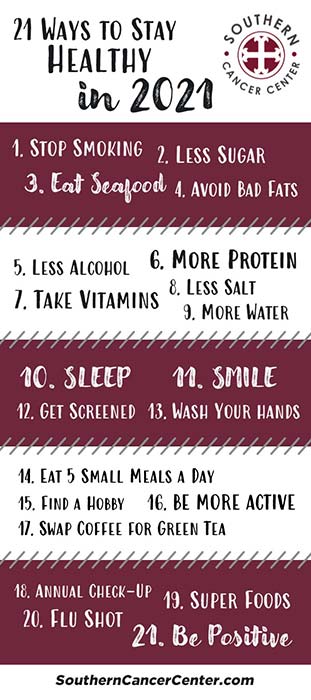It’s hard to imagine, but 2021 is just around the corner. Here are a few tips to help you and your family stay healthy in the new year.
- Stop Smoking: Smoking can destroy your lungs, increase your chances of cancer and gum disease, and have a negative impact on the health of your skin. A few options to help you stop include quitting “cold turkey,” undertaking behavioral or nicotine replacement therapy, and/or taking prescription medication to help ease the side effects.
- Eat Less Sugar: Sugar can lead to excessive weight gain, heart disease, diabetes, poor oral health, and even depression. It is recommended that men limit their sugar consumption to nine teaspoons of added sugar a day, and women to six teaspoons of added sugar a day.
- Eat More Seafood: Seafood contains a lot less fat than all other sources of animal protein. It is great for maintaining heart health as it is low in cholesterol. It is also full of important vitamins and minerals, including potassium, vitamin B, and zinc.
- Avoid Bad Fats: Focus on good fats like fish, avocado, nuts, coconut oil, cream, and cheese, and limit trans (bad) fats found in baked and fried foods, prepackaged snacks and foods, and cooking oils and spreads.
- Drink Less Alcohol: Consuming alcohol increases the risk of developing diseases such as cancer, heart disease, and stroke; and is also linked to liver failure and cirrhosis. It is recommended that men consume no more than 196 grams of alcohol per week and that women consume no more than 98 grams of alcohol per week.
- Eat More Protein: White meat, seafood, and plants are a healthy source of protein, healthier than red meat. Protein helps your body grow, strengthen and repair itself.
- Take a Multi-Vitamin: A great way to fill in the gaps in your diet, vitamins act as an insurance policy to ensure that you are getting what you need to maintain your health and your day-to-day bodily functions.
- Eat Less Salt: Reducing your salt intake to 5 grams per day can reduce blood pressure and risk of cardiovascular disease, stroke, and coronary heart attack.
- Drink More Water: Water works to keep your body hydrated, which is essential for general health. It also keeps your stomach feeling full, gradually reducing the amount of food you consume at mealtimes.
- Get Enough Sleep: Sleep provides your mind and body with the necessary time to replenish itself, for both your physical and mental wellbeing. Sleep deprivation can lead to a decline in your health and overall productivity. Adults should get between seven and nine hours of quality sleep every night.
- Smile More: Smiling not only offers a mood boost but helps your body release cortisol and endorphins that provide numerous health benefits, including reduced blood pressure, reduced stress and a strengthened immune system.
- Get Screened: Scheduling mammograms, prostate screenings, skin cancer screenings, bone density scans, and colonoscopies could help you detect cancer and other health problems early. Some people may also need to be screened for HIV, HPV, or hepatitis B.
- Wash Your Hands: Clean your hands properly and often by washing them for 20 seconds with soap and water. Clean hands can prevent the spread of infectious illnesses such as the seasonal flu and the novel coronavirus.
- Eat 5 Small Meals a Day: Trying to stick to three meals a day can lead to feelings of hunger, unhealthy snacking and binge eating. It is better to eat five smaller meals per day instead, and not ignore your feelings of hunger.
- Find a Hobby: Doing a hobby that you enjoy every day, or regularly, will leave you feeling happier, more confident, can reduce stress and can even give your life more meaning.
- Be More Active: Regular exercise is the key to a healthy lifestyle. It helps you maintain or lose weight, stabilizes your mood through the release of endorphins and will aid you in getting a better night’s sleep. Adults should get at least 150 minutes of moderate-intensity physical activity each week, and include strength training when you can.
- Swap Coffee for Green Tea: Coffee doesn’t do your body any favors, but green tea is packed with nutrients and antioxidants. It offers health benefits, can reduce the risk of developing diabetes and heart disease, and is low in calories.
- Schedule Your Annual Check-Ups: Regular check-ups assist in keeping your health on track. Make an effort to schedule appointments with all of the necessary specialists early in the year, including at your GP, dentist, optometrist and gynecologist, to name a few.
- Eat Super Foods: The high vitamin and mineral content found in superfoods can help your body ward off diseases and keep you healthier. When incorporated into a well-balanced diet, these foods can promote heart health, weight loss, improve energy levels and even reduce the effects of aging.
- Get Your Flu Shot: An annual seasonal flu vaccine is the best way to help protect against flu. Vaccination has been shown to have many benefits including reducing the risk of flu illnesses, hospitalizations and even the risk of flu-related death in children.
- Be Positive: Positive thinking can provide such health benefits as lowering your risk of depression, stress and cardiovascular disease; and also increase your ability to fight off the common cold.
Information taken from LongevityLive.com, MercyHealthSystem.org and MayoClinic.org.

